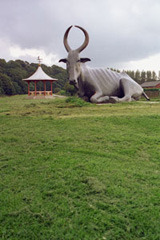Entry requirements: See the
EssentialThe current course structure is shown in the table below that consists of modules which must be studied in the appropriate year - click on the module code for the current module content. After Year 1, students focus solely on studying Anthropology and Biology. If students don't wish to take a particular module or include a third subject then it may be possible take up the option of the more flexible "BSc in Natural Sciences degree. The subjects in which modules have been taken successfully in the final two years are as follows: Anthropology and Biology". As the rules in each year permit, students may take up to 80 credits in one subject and no less than 40 credits in the other subject and always take precisely 120 credits in one year. UCAS applicants are invited to use the app to discover the key modules to self-build a degree
| Year 1 |
| Anthropology | 60 credits: Human Evolution And Diversity (ANTH1091), Doing Anthropological Research (ANTH1101) and Being Human: An Introduction To The History And Practice Ofanthropology (ANTH1111). |
| Biology | 40 credits: Organisms And Their Environment (BIOL1161) and Genetics (BIOL1171) |
| Year 2 |
| Anthropology | 60 credits: Research Project Design (ANTH2187), Biology, Culture And Society (ANTH2207), 40 credits of Level 2 Anthropology to include at least 20 credits from: Mind And Culture (ANTH2297); Primate Societies (ANTH2327); Palaeoanthropology: The Story Of Human Evolution (ANTH2307); Reading The Skeleton (ANTH2337).
|
| Biology | 60 credits: Evolution (BIOL2451), Ecology (BIOL2461) and Behaviour (BIOL2511) |
| Year 3 |
| Anthropology | 40 credits: From the Level 3 Anthropology list. |
| Biology | 40 credits: Modules taken from Ecology In The Anthropocene (BIOL3541); Conservation Biology (BIOL3551); Advanced Topics In Ecology, Evolution Andbehaviour (BIOL3561). |
| Students must take no less than 20 credits and no more than 60 Capstone Modules from the following list: |
| Capstone modules | 20 credit Anthropology Dissertation (20 credits) (ANTH3141); 40 credit Anthropology Dissertation CH/HNS/LA (ANTH3382); 20 credit Biology into Schools (BIOL3431); 20 credit Literature Review (BIOL3451); 20 credit Contemporary Issues in the Biosciences (BIOL3641); 20 credit Science Enterprise (NSCI3001); |
Further details about the modules in the
Anthropology list.
Further details about the modules in the
Biology list.
Below is an example of modules that are timetabled to satisfy these rules except in Year 3 where the set may not include a capstone module. Click on the single digit numbered link on the left to see a sample timetable and the module code to see details about the module such as content, contact hours, teaching methods and assessment methods.
Note that:
- You can vary the balance between the two subjects in all years assuming the rules below and timetable will allow it.
- In Year 3 students are required to take no less than 20 credits and no more than 60 Capstone Modules from two subjects. The minimum number of credits is reviewed on an annual basis as we are working towards students being required to take 40 credits, when this change happens students will be informed explicitly.
- Not all combinations of the modules which make up the degree rules are guaranteed to timetable, but one set will.
- If no student is following the Joint-Honours degree in a given year, then we do not ask for modules to be timetabled for that cohort in the following year.
- The timetable changes each year.
- Future changes in the Joint-Honours rules are either flagged up in the programme regulations in the Faculty Handbook or in the Anthropology/Biology advice.
- Students are welcome to suggest to the Director better guaranteed combinations, but due to the quality assurance process and timetabling the lead in time is one year.
For more information about the Natural Sciences degree programme, please contact:
Professor Tim Roberts
Deputy Head of Faculty
Faculty of Science Office
Level 3 Chemistry Building
Durham University
DH1 3LE
UK
Email: Natural Sciences Director
WWW: Natural Sciences home page


